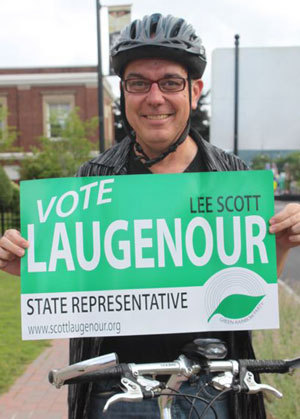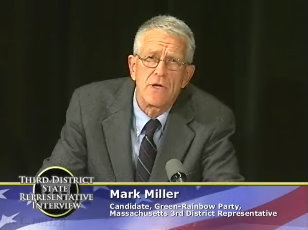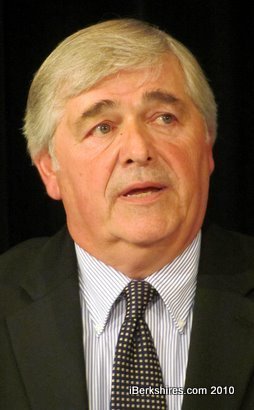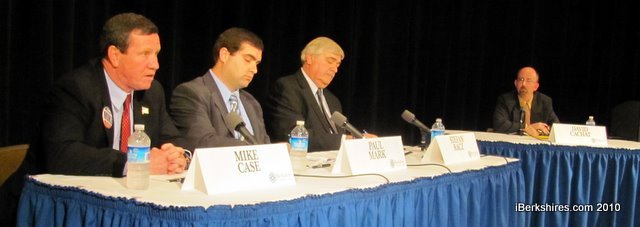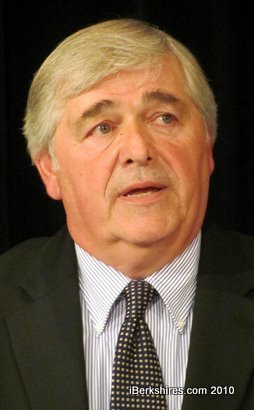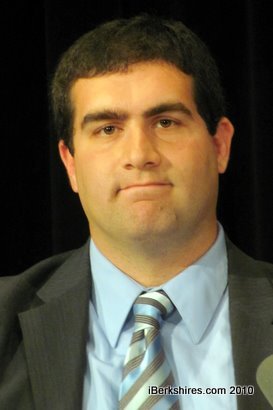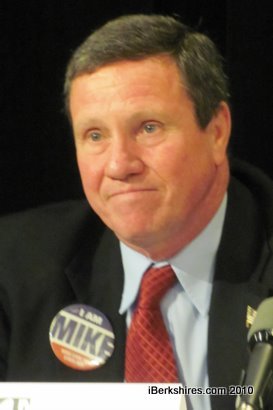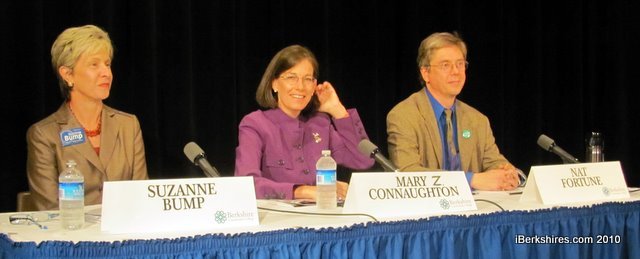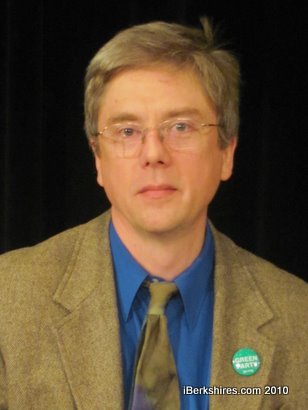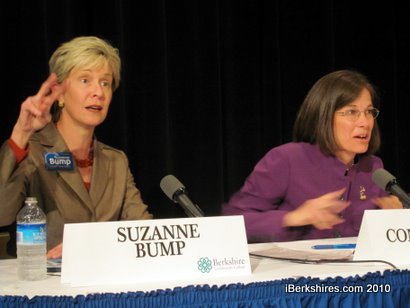| Home | About | Archives | RSS Feed |

Community Leaders Urge 'No' Vote on Question 3
NORTH ADAMS, Mass. — Mayor Richard Alcombright, state Rep. Dan Bosley, state Sen. Benjamin Downing, D-Pittsfield, Adams Town Administrator Jonathan Butler, Clarksburg Town Administrator Michael Canales, Florida Town Administrator Christine Dobbert and Williamstown Town Manager Peter Fohlin, have come out against what they say would be the "devastating fiscal impact to all North Berkshire communities" if ballot Question 3 is passed.
Question 3, to be voted on in next week's election, proposes a reduction of the state’s sales tax from 6.25 percent to 3 percent.
According to a statement released by Alcombright's office on Oct. 28, at the Oct. 20 Massachusetts Mayors meeting attended by Alcombright, Massachusetts Taxpayers Foundation speaker Andy Bagley described Question 3 as “heading over the cliff."
The state already faces a $2 billion dollar shortfall in the upcoming fiscal 2012 budget, which would jump to $4.5 billion if the voters approve Question 3. According to MTF, the resulting massive spending cuts would eliminate or erode a wide range of services from education and public safety to health care and human services.
“Our communities would be devastated by the loss of revenue in FY2012 and passage of Question 3 would additionally assure deep and chaotic cuts right after the first of the year. It is projected that the City of North Adams would be cut by as much as $2.1 million dollars in FY2012 if Question 3 passes and we would certainly see significant revenue reductions in this current fiscal year. Overall, the FY2012 impact on municipal and school budgets in North Berkshire from Question 3 alone would be over $4.6 million dollars in addition to the already projected cuts of up to 15 percent on both municipal and school aid. All in all, with the passage of Question 3 and anticipated FY2012 cuts, North Berkshire could lose close to $8.8 million dollars in state aid,” Alcombright said in the statement.
Fohlin added, “Massachusetts Taxpayers Foundation projects Williamstown and Mount Greylock Regional School District will lose over $400,000 if Question 3 passes. The effect on education, public safety, and public works would be devastating. I can’t imagine asking Williamstown property owners to fill such a huge gap.”
The state has cut municipal and school funding by more than 18 percent over the past three years and the passage of Question 3 would assure reductions in funding of over 20 percent next year. These massive reductions in revenue would mandate deep and painful cuts to all segments of municipal and school budgets for all communities in North Berkshire County, the statement concluded.
| Tags: Question 3, sales tax |
Outsiders Up for the Challenge
 SHEFFIELD, Mass. — In a state that sees only blue and red, it ain't easy being green. But Lee Scott Laugenour, the Green-rainbow candidate for state representative for the 4th Berkshire District, is up for the challenge. In fact, he said, he "wouldn't do it any other way."
SHEFFIELD, Mass. — In a state that sees only blue and red, it ain't easy being green. But Lee Scott Laugenour, the Green-rainbow candidate for state representative for the 4th Berkshire District, is up for the challenge. In fact, he said, he "wouldn't do it any other way."
"Every campaign has its challenges, it's hard work," he said in a phone interview. "You have to really enjoy the hard work. And I think campaigns such as mine that are outside of the big money paradigm are sometimes a little easier in the rural towns."
The party platform for the Green-Rainbow party is based on the "10 Key Values." Among them are grassroots democracy, ecological wisdom and decentralization, issues that, according to Laugenour, are very relevant to Berkshires residents and business owners who have fallen on hard economic times.
"People are telling me that finding out about my campaign is refreshing," said Laugenour, who took to his bicycle to campaign. "Basically right now we have a one party system so debate doesn't occur. No one is arguing on Beacon Hill. The checks that they cash are not free. Money isn't free. We are going to be the ones who don’t cash the check."
|
|
Jobs, tax and debt and health care are foremost on Laugenour's list of issues he hopes to tackle in Boston. He is not alone. Mark C. Miller, also a Green-Rainbow candidate, is campaigning for state representative for the 3rd Berkshire District and the party has candidates for governor (Jill Stein) and auditor (Nat Fortune). Miller said he "just gave up on Democrats" after they abandoned the single-payer proposal for state health insurance.
"You would think we are a progressive state but we're not," he said. "There's a lot of distrust and anger at both major parties, so they love the idea of a person who is neither. People are fed up and desperate and frustrated."
Both Laugenour and Miller have seen that frustration play out time and again while on the campaign trail.
"People have so many worries, they're just trying to scramble," Miller said. "They don't believe in politics, they have no interest in politics; they're alienated. When I've gone door-to-door there are definitely folks who say they're not going to vote, who say 'that's not for me baby.'"
Kenny Butler, campaign manager for independent candidate Stefan Racsz in the 2nd Berkshire District, said that he has also come up against cynicism among voters.
"Both major parties are very entrenched and powerful," he said. "People are getting tired of bailing out big businesses, it's so anti-democratic. These are not big towns; not like Boston. You know what you're paying in taxes."
|
Mark Miller is hoping to gain traction in his hometown of Pittsfield; Stefan Racz is positioning himself as an alternative to his major party opponents. |
|
Yet, despite the voter disgust and apathy, or perhaps because of, Butler said people are drawn to the grassroots appeal of Racsz's campaign.
"This campaign is a small business," he said. "This is all about the individual. People think for themselves. They look at themselves and they decide for themselves. I don't think we've been given choices until recently. If voters have the choice, they'll make the choice."
Whether that choice is in favor of the blue the red or the green, Miller is heartened by what he sees as an organic reaction in favor of major political change. He cited Transition Town, a community group that has gained attention in Great Barrington and North Adams, as evidence of that change.
"That's happening just automatically," he said. "Berkshire County is ahead of the curve. A lot of people have been loyal Democrats all of their lives but they see that disintegrating. The problem is getting people's attention."
| Tags: independent, Green-Rainbow |
Democrats Rallied for Final Election Push

We didn't make Gov. Deval Patrick's meet and greet at Richmond Consolidated School on Wednesday night, but we were there for a rally at the Itam Lodge in Pittsfield on Friday night. More than 100 Democrats were at the event to cheer Patrick on to a second term. Patrick's been keeping a slim lead in the polls against his closest opponent, Republican Charlie Baker; independent Tim Cahill and Green-Rainbow candidate Jill Stein have been trailing in the single digits.
Pittsfield Mayor James Ruberto, one of Patrick's biggest cheerleaders, challenged party members to turn out 80 percent for the former Clinton administration official. Patrick, meanwhile, pointed to pension and ethics reform he's pushed; consolidation of the state's transportation departments and investments in education, life sciences and green technology. But his administration has been overshadowed by sinking revenues as the state dealt with the global financial crisis. The recession has cost jobs and cut billions from the state budget affecting programs and departments. Recent news on the jobs front was mixed — the state gained jobs or lost them, depending on the report — but the Democratic incumbent said the news was hopeful. "The point is we still have a lot of people who need a way forward in this economy," he said. "We're climbing out this hole faster than the rest of the country." The way to do it isn't to create more unemployment, he said, taking a swipe at Baker's proposal to cut 5,000 state workers. Rather, he said, the best path was continued investment in innovation, education and infrastructure. "Because we've invested in growth, our revenue is returning in step."
|
| Tags: patrick, rally |
Three Make Case for 2nd District Seat
|
Michael Case, left, Paul Mark and Stefan Racz meet Monday night for a televised debate at BCC with David Cachet of Pittsfield Community Television. |
PITTSFIELD, Mass. — Candidates hoping to represent the sprawling 2nd District on Beacon Hill met for the second time Monday for a televised debate at Berkshire Community College that covered topics from charter schools to raw milk.
Democrat Paul Mark of Hancock, Republican Michael F. Case of Washington and independent Stefan G. Racz had debated earlier in the day on the local Vox Radio station; Monday night it was in front of the cameras for The Pittsfield Gazette and Pittsfield Community Television, with David Cachat of PCTV's CityLink moderating.
Perhaps the most interesting thing coming out of the night was that the three candidates weren't all that far apart. They said communities should have control and input on major developments within their borders, such as casinos and wind power, and funding for education and infrastructure — as long as the state paid its fair share.
|
Stefan Racz |
Their differences were more matters of degree with a few exceptions, such as legalizing marijuana: Case, a retired police officer and military veteran, was against; Racz for, and Mark, an attorney and telecom worker, only for medical marijuana.
They stressed the importance of farming and open space for the largely rural, crescent-shaped region that slices through Berkshire County and into Hampshire and Franklin counties.
"We are providing some of the most gorgeous views in the state," said Racz, a Buckland selectman. "We need to preserve that for future generations."
While supporting alternative energy, he was concerned that wind-turbine siting here would mean ridgelines and the destruction of the environmental beauty. The loss of farms and failure to preserve open space could put lands at risk for developers.
Case said he supports wind turbines but only if the community has significant input and agricultural programs for farming. "I've spoken to many farmers who own a lot of land," who may be land wealthy but cash poor, he said. "They're just barely getting by. We need to give them tax breaks."
|
Paul Mark |
Mark said he did not support the state's wind siting law, which limits local input, but would back the expansion of raw milk sales to home delivery. He also spoke in favor of agricultural cooperatives such as Denis Guyer, the man they're trying to replace, is setting up in Dalton.
Racz said he didn't support milk price regulation; Mark and Case said they did, with Case adding only if it was not to the detriment of the farmer.
Both Case and Racz said they'd support a single destination casino in the state because, said Case, "it would draw other than just gambling because it would have shows, and other conventions ... it would be good for the economy of Massachusetts." Racz said he believed "one casino would be a testing ground for income to the state," as long as it did not infringe upon current cultural venues.
Mark said he supported the Senate bill that had planned for three casinos. "I don't think gambling is a magic cure-all but I don't see anybody else really proposing anything to make new jobs," he said. "I am against slot parlors and racinos because they don't have the job creation element so you would only get the bad parts of gambling."
|
Michael Case |
All three said the state's health insurance reform had worked well to expand access but didn't think it had done well enough in controlling costs.
"I don't think it was the best solution, I think a single-payer would have been a much better solution," said Mark. "We could serve as a model for the nation."
Racz said the reform was an innovative idea but the state hadn't felt the total negative impact because elements of the federal health insurance reform will begin kicking in in Janury. "There's not enough money right now," he said, in part because insurance companies were raising rates. "We have to focus extremely heavily on insurance companies and the drug companies. ... make sure they're towing the line."
Health insurance has improved greatly, said Case, but "what we don't know yet is what the cost is going to be. I've heard as high as 42 percent of the state budget is going to health care now. ... Single-payer may be a dream down the road but not right now with the economy the way it is."
They said they would advocate for the state to pay its fair share of the regional school transportation. Racz said the state should take on the contracts for busing and let the schools use the money for education. They agreed it was important to the students to ensure so-called circuit breaker special education funding from the state and were leery of charter schools.
"It's a good idea but you don't want them taking money away from the public school system," said Mark. Case said parents should have the option, but "it's a drain on the public schol and they don't take the children who have problems."
Racz said regular public schools should be held to the same standards of review since charter schools can be disbanded if they don't live up to their mission.
Case said more incentives should be offered to attract and retain businesses. "We need to make the business climate in Massachusetts competitive with other states." Mark said the new creative economy should be supported and bringing health care costs under control and broadband to the region will help spur growth. "Local jobs mean local revenue."
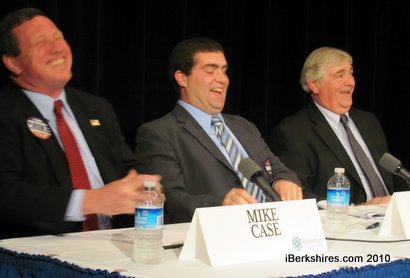 |
Racz said one of his initiatives is the 2nd Berkshire Business Alliance, a conduit for small businesses in the district to ally and bring the issues affecting them to the attention of the representative. "You have to remember, small business carried us through this recession; they didn't get bailouts."
All three said they would have voted against last year's increase in the sales tax.
Each pledged to do their best to listen to constituents. Case said he would keep an office, likely in Dalton, for constituent services and a staffer to meet with selectmen throughout the district to help keep him apprised. Racz said he would "not favor the town of Buckland over the town of Dalton, Windsor or Peru" and he would get feedback from the towns.
Mark, at 31 the youngest of the candidates, annoyed his opponents with claims that he would keep going to all 22 towns in the district because he was "the only with the energy to keep doing it." The older men said their energy was fine, thank you very much, although Case had a little fun later with Mark by pretending to nod off during his opponent's closing remarks.
The debate will be rebroadcast on PCTV; we should have audio up later Tuesday.
| Tags: Mark, Racz, Case, debate |
Auditor Candidates Trade Jabs
|
Candidates for auditor Suzanne Bump, Mary Z. Connaughton and Nathanael Fortune debated at BCC on Monday night. |
PITTSFIELD, Mass. — The two major party candidates for the state auditor's job spent Monday night trading jabs over negative campaigning and past scandals, leaving the Green-Rainbow candidate to position himself as outside the fray — and of business as usual.
The debate was sponsored by The Pittsfield Gazette and Pittsfield Community Television and hosted at Berkshire Community College. One of the candidates, Suzanne Bump, 54, is a resident of Great Barrington, (which she confirmed again on Monday).
|
Best quote of the night: Fortune on whether he's a spoiler in the race. 'If electing a Democrat to office would make a difference, we'd already be living in Nirvana.' |
The Democrat and former labor official for Gov. Deval Patrick is seeking the position against Republican candidate Mary Z. Connaughton, 50, of Framingham, former director of the Massachusetts Turnpike and a certified public accountant, and Green-Rainbow candidate Nathanael Fortune, 49, a Smith College physics professor and Whately School Committee chairman.
Moderator Daniel Valenti, local writer and political commentator, prefers a free-form style of debate that allows give and take between the candidates. "We will encourage dialogue among the three candidates and we would prefer them to interact with each other rather than me," he said at the beginning of the hourlong debate.
He didn't have to worry about dialogue: Bump and Connaughton breezily clashed in a practiced performance — it was, after all, about the 10th time they'd debated — prompting Fortune to quip, "I did offer to sit between these two."
Bump started the day in Boston on a "Donut Fund Express" to the Berkshires, making stops at independent doughnut shops along the way to highlight recent stories about fiscal mismanagement at the State Lottery in 1990s — some of which occurred during Connaughton's tenure there as chief financial officer. Money was routed to a so-called "doughnut" fund to hide expenses for parties, entertainment and promotional events.
"Yes, these practices were going on for decades before I got there; they ended under my watch," said Connaughton, who claimed she had done much to put in place "culture-changing moves" within six months of joining the Lottery. "I fixed it; I was hired to clean up a mess and I did it."
The Romney appointee waved an endorsement from the liberal-leaning Berkshire Eagle on Bump's turf and noted she is the first CPA to ever run for the post. Bump waved a state auditor's report and attacked Connaughton's performance in dealing with abandoned properties she said cost the state $16 million. Connaughton said it was about eliminating a sweetheart deal with one contractor to ensure competition and getting the money into the taxpayers' pockets, not the state's general fund.
"Suzanne, you just don't get it, you just don't get it," said Connaughton, which elicited some applause from the audience left from the earlier debate for the 2nd Berkshire District.
Bump dismissed her opponent's "soaring rhetoric," "it's her failure to take responsibility that's the most disturbing thing."
Valenti questioned Bump on the recent flap over where her primary residence is. She and her husband had filed for property tax exemptions on both their Great Barrington home and South Boston condo. Bump said Boston had changed the rules without informing them.
All three candidates said they would be advocates for the public and take a more aggressive stand on looking at not just expenditures but outcomes to see if public money was being spent wisely. They all said they would bring in an independent auditor to review the office, which hasn't been done in 20 years. Bump and Fortune said the division's 300 employees and $17 million budget were enough. Connaughton said she'd have employees reapply for their jobs as way to review staffing and qualifications
|
Bump and Connaughton try to get their points across at the same time. |
Fortune tried to keep his comments to the role of the auditor ("it's hard to be a candidate if your mother has trained you if you don't have anything nice to say ...") and said he would be an advocate for the public. He noted his role in reducing energy costs in his own school district through analysis and research and recognition by the state school committees association for his analysis of state and local education funding.
"The three of us have been to enough debates that to some extent we can say each other's points. The most common from Suzanne is you should be a bureaucrat to be this and, from Mary, you should be an accountant or an auditor," he said. "Both those skills are valuable in being a state auditor but neither of them are essential."
Politics and lobbying "distorts the priorities," he said; if public dollars paid only for public services, it would free up $1 billion. "You have to follow the money."
Bump said her experience in state government, during which she oversaw teams of auditors and researchers in investigating spending and outcomes for various work-force programs to "go beyond simply how much money did we spend, but what did we get for it and how can we do it better."
"You need somebody who can set priorities and be a leader and that's what I have done when I was a legislator and as a cabinet secretary," she said, agreeing "somewhat" with Fortune. "We do have billions of dollars in tax exemptions, and tax credits and tax incentives and few of those individual programs have mechanisms to determine if the taxpayers are really getting the benefits they're supposed to get."
Connaughton touted that fact that she is the only CPA who has ever run for auditor and her experience working in the state treasurer's office and the former MassPike. She pledged to run a professional department and bring "lots of sunshine" to Beacon Hill.
"I do not need on-the-job training at the taxpayer's expense. [The auditor] is the people's eyes on Beacon Hill, it's their voice on Beacon Hill to make sure our tax dollars are being spent properly," said Connaughton. "I will manage this office in an extremely professional way ... politics has nothing to do with the state auditor's race."
Toward the end of the debate, Connaughton tried to get a pledge from Bump not to engage in negative campaigning when her television ads hit the air on Wednesday. Bump said it depended on what Connaughton meant by negative campaigning.
"They are going to contain positive things about my candidancy," said Bump and, in response to questions, confirmed "Mary's name will be in it."
Fortune said he'd be happy to take the pledge. "I'm not running any ads at all. I think I'm running a very frugal campaign ... I'm setting a good example for state auditor."
The debate will be rebroadcast on PCTV. We will try to have audio up later Tuesday.
| Tags: auditor, debate |

